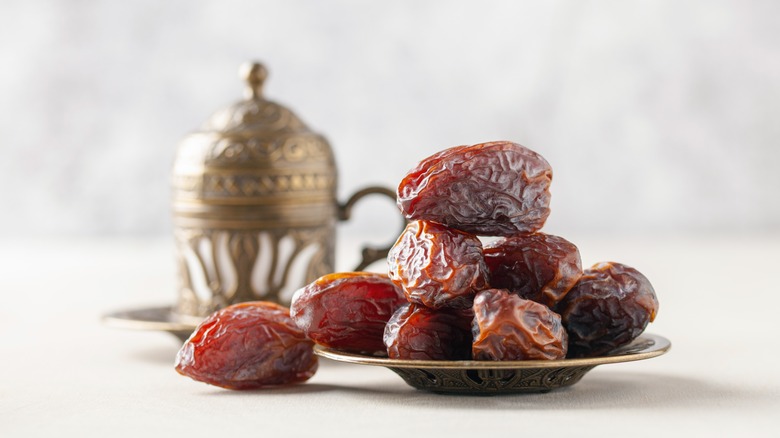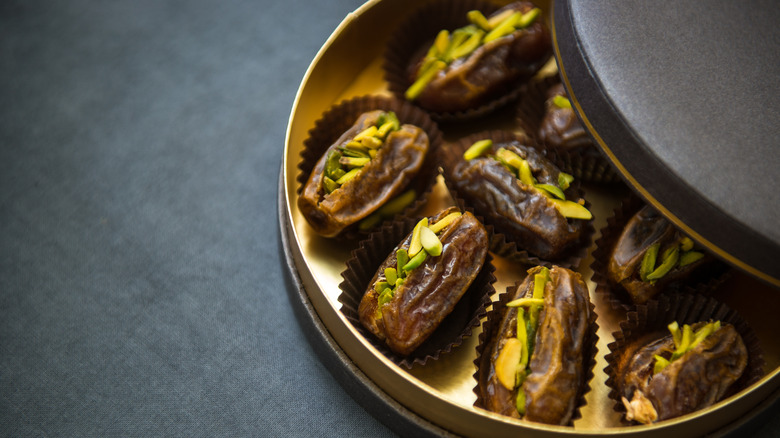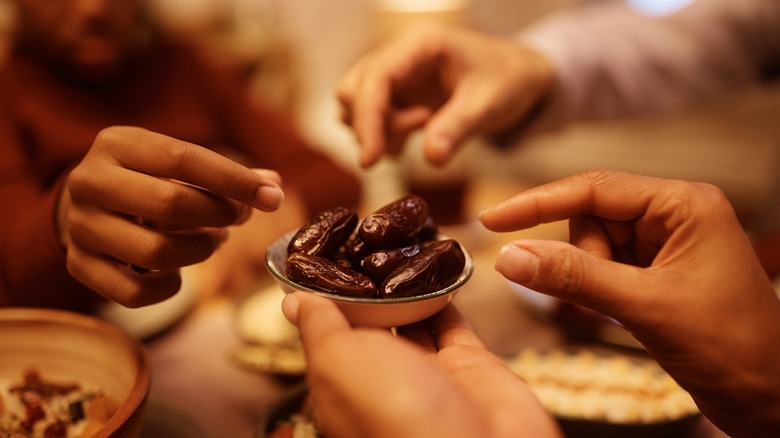The Reason Dates Are A Staple Ramadan Food
For Muslims around the world, Ramadan is a vital period of fasting and reflection. The holiday takes place during the ninth month of the Islamic calendar and lasts for either 29 or 30 days. During the month-long holiday, Muslims fast from sunrise to sunset. This fast prohibits any eating or drinking of any kind, and is done to encourage reflection and bring worshippers closer to the experience of the impoverished. It is one of the holiest months on the Islamic calendar and includes many important and strictly-followed traditions.
Perhaps one of the most vital traditions at the core of Ramadan is the Iftar, or breaking of the fast, which happens each day of Ramadan after the sun has set. While you can break your fast with any food, breaking it with a date is considered the best option. The brown, oblong, and incredibly sweet fruit was a favorite of the Prophet Muhammad due to its nourishing qualities, and Muhammad specifically instructed his followers to break their fast with dates, or with water if no dates were available.
Dates, which are particularly prominent in the Middle East, hold very specific religious importance among Muslims. The fruit was even mentioned over 20 times in the Quran, the holy text of Islam. Starting Iftar by eating dates is an act of following Prophet Muhammad's example. For this reason, many Muslims serve dates with traditional Ramadan dishes and pastries during this holiday.
More than just a fruit
The importance of dates in the religion of Islam does not end (or begin) with Ramadan. Prophet Muhammad often extolled the nutritional benefits of this fruit, which comes from the date palm tree, and he even instructed his followers to consume seven dates each morning. Specifically, he instructed Muslims to eat ajwa dates.
Ajwa dates are small in size, smaller than the much more popular medjool date variety, and darker in color. Medjool dates, on the other hand, are much larger and sweeter, with a deliciously smooth texture. But that doesn't mean you are restricted to either medjool or ajwa dates. After all, there are 15 types of date fruits, each with specific flavor profiles and health benefits. You can use any date variety to begin Iftar, and many people cook specific dishes that incorporate dates for the occasion. Stuffed dates and date cookies are particularly popular dishes to serve during Ramadan.
Whichever date variety you choose, this fruit is a staple when it comes to breaking fast. And even if you do not participate in Ramadan, you can (and should) appreciate dates for their delicious and nutritious qualities.
The health benefits of breaking a fast with dates
As it turns out, breaking your fast with dates isn't just a way of incorporating traditional practices into this sacred holiday. Dates actually have many health benefits and are a great food of choice for breaking your fast. For one, dates contain sugars, which are vital for energy. Dates can help to balance blood sugar after a day of abstaining from food and drink. This can help to reinvigorate those who have spent the day fasting, bringing a boost of energy that other foods simply cannot replicate.
Additionally, dates are rich in potassium, iron, calcium, magnesium, and B vitamins. These nutrients are essential for those participating in the month-long fast, and these micronutrients can help to energize after a day of reflection and abstinence from food. Beyond these health benefits, dates are also easy to digest and are rich in fiber, which can help those participating in Ramadan avoid certain digestive issues that might otherwise occur during the month. This can include an upset stomach or constipation, which tends to occur due to lack of consistent meals. This means that dates are the perfect food to break one's fast without throwing one's digestive tract into turmoil. For these reasons, along with its religious significance, dates are an essential part of not only Ramadan, but the religion of Islam.


